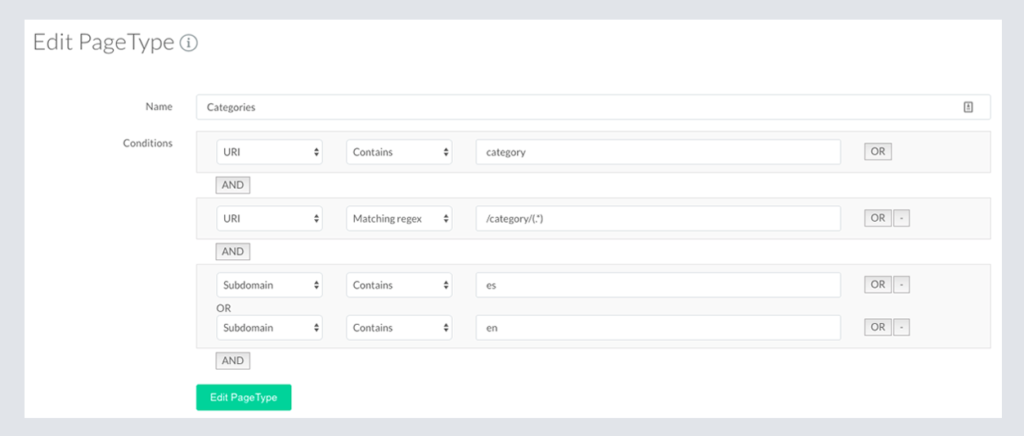Benefits of Crawl Segmentation
In the same way that no two websites are the same, we all have different needs when analyzing a site. This may vary mainly depending on the type of your web (e-commerce, business, news sites, blogs, etc.). Crawl segmentations allow us to obtain specific SEO audits extracting accurate and precise data from particular areas of a site. It is the best way to check and monitor your SEO strategies. It will also show you which areas of your Website require more effort and which are working better in terms of SEO.
What is a Crawl Segmentation?
There are some SEO crawlers in the market that allows you to use filters to create segments. FandangoSEO has a unique segmentation tool that permits to elaborate custom PageTypes and Sections so you can obtain specific crawl data for a given area. This feature has numerous filters with multiple possible combinations that make it one of the most complete segmentation tool in the current market.
How to Create Crawl Segments: Add PageTypes & Sections

To create segments using FandangoSEO, you only need to configure it at Config > “Edit PageTypes” or “Edit Sections.” Take the following steps to add your PageTypes and Sections.
Step 1: Put a name to a PageType/Section
Step 2: Filter your data using URI, subdomain, HTML value, and Datalayer value.
- URI or Path – It is the last part of a URL after the domain name. You can filter your URLs to create PageType/Section using a URI and our comparators (contains, not contains, equal, not equal, and matching regex).
- Subdomain – It is an additional part of the main domain, usually located before the domain. A Subdomain is created to help organize your content and to navigate through different sections of your site. Filter your URLs using Subdomains Conditions to create PageType/Section.
- HTML value – In order to use the HTML value to segment your PageType/Section, you have to previously fill the Xpath for PageType/Section in Project Configuration. Remember, you can use different comparators to have an accurate segmentation.
- Datalayer Value – To use values from Datalayer to segment your PageType/Section, you have to fill the Datalayer Key Name in the Project Configuration previously. Remember again that you can use different comparators to have an accurate segmentation.
Step 3: Use comparators (contains, not contains, equal, not equal, and matching regex.) We give you a complete guide on how to use Regular Expressions at the bottom of the screen.
Step 4: If you wish, add conditions “and” “or” to specify the exact PageType/Section you want to create.
When you add a new segment, the app reviews all the crawled pages that obey the conditions and display them together on the architecture info. Architecture info > PageTypes or Sections
What kind of segments are recommended according to your web type?
As mentioned above, depending on your site type, it is better to create one kind of segment or another. In other words, there are segments more useful to understand the SEO performance of an e-commerce website than a blog site or vice-versa. Here are some segmentation ideas that you can apply according to your website type.
e-commerce
Use PageTypes to indicate what kind of pages or templates you have on your Website. Sections can be used to define the different categories you have within the products that you sell. For example, in an eCommerce store that sells organic food, we could find the following.
PageType examples:
- Homepage
- Product listing
- Product detail
- Blog
- Articles / Posts
Section examples:
- Greengrocery
- Organic meat
- Baby & kids food
- Cooking herbs
News Websites
In online newspapers, we could make the following segmentations.
PageTypes:
- Homepage
- Categories
- News
- Videos
- Opinion
Sections:
- News
- Local news
- Sports
- Politics
- Business
- Opinion
Blog
On a beauty website, for example, we could find the following.
PageTypes
- Homepage
- Categories
- Tags
- Posts
Sections
- Beauty Tips
- Product recommendation
- Healthy Lifestyle Tips
- Nutrition
Now that you know the benefits of segmentation for SEO try it out for yourself! Soon you’ll see all the extra insights you can get by crawling this way. If you have any doubts about the best way to segment your Website, do not hesitate to contact us. We are here to help you. 😉
Last Updated on July 29, 2022 by Hannah Dango




